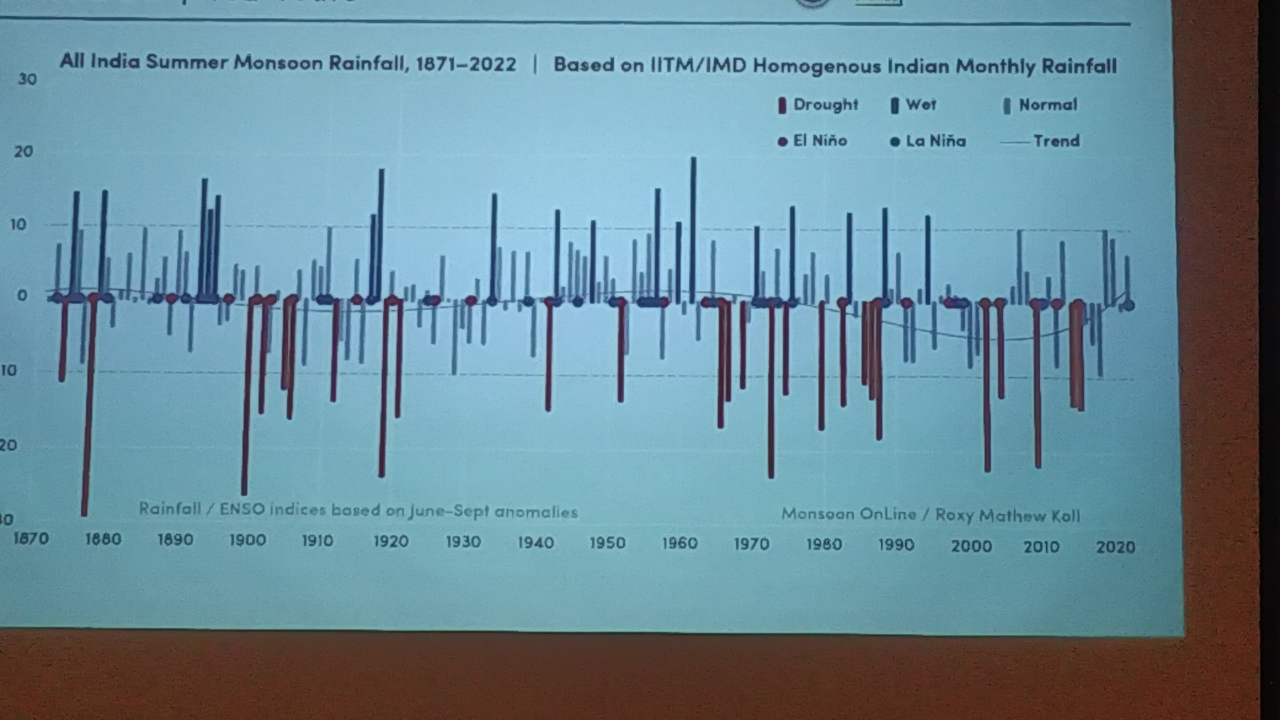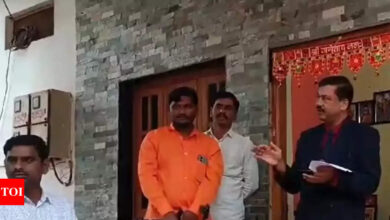India
Intense debates needed to study increasing heatwaves, below normal monsoons, abnormally heating up of oceans | India News

[ad_1]
BATHINDA: There might be countless instances to show that climate change is here impacting lives, livelihoods, food production and much more, but a number of journalists from across the length and breadth of India having interest in studying changing climate patterns learnt it through two days at Bengaluru with presentations by experts of the subject. Right from increasing heat intensity to erratic monsoons, the subject was vast with scope to delve deep into, while oblivious about the election frenzy the Karnataka was in. The journos assembled for serious thoughts and deliberations over the climate science which is of paramount concern for the entire world.
Early heatwaves impacting wheat production in March 2022 to cooler last week of April was projected to show weather patterns are changing as the extreme weather events are on the rise along with heat waves, below normal monsoons, abnormally heating up the oceans. As experts analysed the monsoon data for 152 years, ever increasing heat stress, El Nino, La Nina and what not, it kept on increasing the curiosity of the journos to know more and delve deep into as how the weather is changing to impact the world and making scientists, experts, climate change activists to rise to the occasions and find ways to come out of it apart from asking the powers that be to limit the carbon emissions.
As the experts presented how wet days, months and even years are decreasing because of erratic monsoons, giving way to more dry spells which have vast impacts on lives, livelihood as how labour intensive things are feeling the worst pinch with millions of working days being ruined with climate scientist at Indian Institute of Tropical Meteorology (IITM) Roxy Mathew Koll analysing monsoon patterns from 1871 to 2022 and Luke Parsons, postdoctoral associate with Duke University putting light on wet-bulb temperatures as to how out of the 220 billion hours lost in a year the 101 billion hours (46%) were from India alone.
Not only the earth surface but how the seas are disturbing marine lives were precisely presented making those in their youthful days of climate journalism to keep their eyes wide open without any blink for Vimal Mishra from Indian Institute of Technology (IIT) Gandhi Nagar showed how only five heatwaves during the pre-monsoon season in 2022 extended for 36 days, telling how intensity and duration of heatwaves is increasing over the years putting marine lives too on danger and visiting Prof at IIT Bombay Raghu Murtugudde, presenting how every decade turning warmer than the previous.
The two days national workshop studying heat intensity and its impacts in various sectors organised by ‘Climate Trends’ were eye opener if you want to learn how climate should be one of the biggest topic of discussion across the globe as normally we read in newspapers or in visual stories that the vulnerable sections are most hit by the global warming as was witnessed last year in Pakistan which despite being historically least emitter witnessed the unprecedented floods which devastated a considerable part of the country but here the facts were put to table with slide after slide and map after map showcasing how each passing year and decade is turning more lethal than the previous as Climatologist Friederike Otto from Imperial College London showed how human induced climate change is affecting weather and climate extremes
Against the backdrop as how climate is putting its seal when it comes to solutions or measures to contain the impact it was found that not much is being done and even the heat action plans (HAPs) formed or being formed in the country not only are inadequate but highly lacking in serving the aim for which these have been formed. Centre for Policy Research’ Aditya Valiathan Pillai analysis found that various serious points are not being taken into consideration in forming these HAPs as vulnerable hot spots which impact crop production ultimately impacting food security failing to get any such HAPs or the roadmap to deal with serious issue.
Early heatwaves impacting wheat production in March 2022 to cooler last week of April was projected to show weather patterns are changing as the extreme weather events are on the rise along with heat waves, below normal monsoons, abnormally heating up the oceans. As experts analysed the monsoon data for 152 years, ever increasing heat stress, El Nino, La Nina and what not, it kept on increasing the curiosity of the journos to know more and delve deep into as how the weather is changing to impact the world and making scientists, experts, climate change activists to rise to the occasions and find ways to come out of it apart from asking the powers that be to limit the carbon emissions.
As the experts presented how wet days, months and even years are decreasing because of erratic monsoons, giving way to more dry spells which have vast impacts on lives, livelihood as how labour intensive things are feeling the worst pinch with millions of working days being ruined with climate scientist at Indian Institute of Tropical Meteorology (IITM) Roxy Mathew Koll analysing monsoon patterns from 1871 to 2022 and Luke Parsons, postdoctoral associate with Duke University putting light on wet-bulb temperatures as to how out of the 220 billion hours lost in a year the 101 billion hours (46%) were from India alone.
Not only the earth surface but how the seas are disturbing marine lives were precisely presented making those in their youthful days of climate journalism to keep their eyes wide open without any blink for Vimal Mishra from Indian Institute of Technology (IIT) Gandhi Nagar showed how only five heatwaves during the pre-monsoon season in 2022 extended for 36 days, telling how intensity and duration of heatwaves is increasing over the years putting marine lives too on danger and visiting Prof at IIT Bombay Raghu Murtugudde, presenting how every decade turning warmer than the previous.
The two days national workshop studying heat intensity and its impacts in various sectors organised by ‘Climate Trends’ were eye opener if you want to learn how climate should be one of the biggest topic of discussion across the globe as normally we read in newspapers or in visual stories that the vulnerable sections are most hit by the global warming as was witnessed last year in Pakistan which despite being historically least emitter witnessed the unprecedented floods which devastated a considerable part of the country but here the facts were put to table with slide after slide and map after map showcasing how each passing year and decade is turning more lethal than the previous as Climatologist Friederike Otto from Imperial College London showed how human induced climate change is affecting weather and climate extremes
Against the backdrop as how climate is putting its seal when it comes to solutions or measures to contain the impact it was found that not much is being done and even the heat action plans (HAPs) formed or being formed in the country not only are inadequate but highly lacking in serving the aim for which these have been formed. Centre for Policy Research’ Aditya Valiathan Pillai analysis found that various serious points are not being taken into consideration in forming these HAPs as vulnerable hot spots which impact crop production ultimately impacting food security failing to get any such HAPs or the roadmap to deal with serious issue.
#Intense #debates #needed #study #increasing #heatwaves #normal #monsoons #abnormally #heating #oceans #India #News






